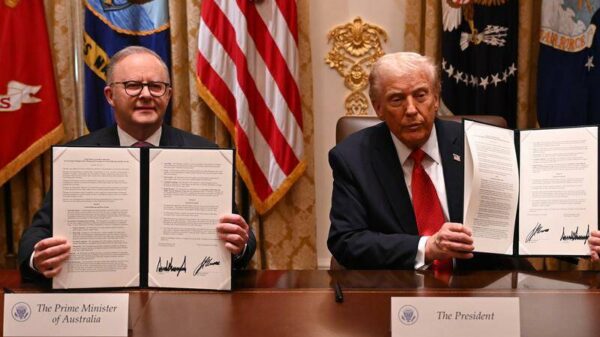UPDATE: Australian doctors in Gaza declare a dire health crisis as the ongoing conflict continues to devastate the region. With reports indicating that it could take decades to heal the health impacts of the war, medical professionals express urgent hopes that a fragile ceasefire will allow essential supplies to reach those in need.
Dr. Thienminh Dinh, an emergency physician from Brisbane working with Doctors Without Borders, revealed alarming statistics regarding the health crisis. “Malnutrition and amputations are on the rise, and the emotional trauma is intergenerational,” she stated. Dr. Dinh, who recently returned to Gaza for a two-and-a-half month mission, described her experiences through voice notes, sharing her chilling observations of children drawing scenes of violence. “Six-year-olds are depicting stick figures lying in blood,” she reported.
As winter approaches, the urgency intensifies. Dr. Dinh anticipates encountering an emaciated population struggling to recover from injuries, lacking food, water, shelter, and essential medical care. “It’s a race against time,” she emphasized. The situation has been exacerbated by Israel’s blockade, leading to crippling shortages of medical supplies. A recent study published in The Lancet revealed that crucial medicines, including treatments for diabetes, hypertension, and epilepsy, are unavailable in any of the 14 functioning health facilities surveyed.
Access to prosthetics for amputees is virtually nonexistent, with Gaza also facing severe shortages of crutches. Dr. Dinh noted that an orthopaedic surgeon working with the charity has been detained by Israeli authorities for nearly a year, further straining medical resources.
While Israel has allowed more aid into Gaza since the ceasefire began, Dr. Kaylene Tompkins, a hospital manager from Geraldton, warns that significant constraints remain. “We are still struggling to bring in enough medical supplies,” she said, pointing to delayed cargo shipments from Egypt and Jordan. The ongoing conflict has left civilians living in constant fear of renewed violence.
“The scale of destruction is beyond words,” Tompkins added. “People in Gaza cannot simply return to their normal lives. The road to recovery is long and challenging.” Medical staff are grappling with their own emotional trauma, which will leave lasting effects on both caregivers and patients alike.
As the situation develops, the international community watches closely. The potential for escalating tensions remains high, with both sides accusing each other of violating the ceasefire terms. Just over the weekend, Israel conducted airstrikes targeting what they claimed were Hamas positions, while Hamas has yet to release some Israeli hostages, citing difficulties in accessing their locations due to destruction.
As aid organizations like Doctors Without Borders continue their efforts, the urgent need for comprehensive support and attention to Gaza’s humanitarian crisis is more pressing than ever. The world must act to ensure that essential medical supplies reach those suffering amidst this brutal conflict.































































